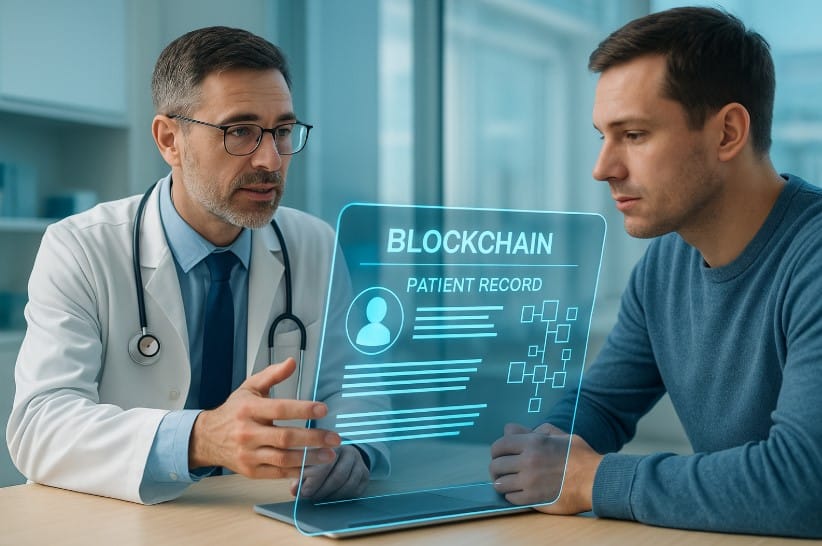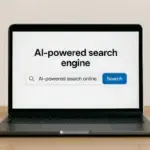Now Reading: How Blockchain Health Records Are Transforming Patient Care
- 01
How Blockchain Health Records Are Transforming Patient Care

How Blockchain Health Records Are Transforming Patient Care
Discussing Blockchain health records might sound high-tech, but they’re already in use and starting to change how hospitals care for patients. If you’ve ever had to repeat your medical history over and over, or waited days for test results, you know how frustrating the system can be. The blockchain records approach aim to fix that, making your health information easier to share, safer, and always up to date. Let’s take a closer look at how this new tech is shaking things up in hospital and patient care.
The Big Problem with Today’s Health Records
Hospital visits are becoming a nightmare. You tell one nurse your symptoms, then repeat everything to a doctor, and maybe even again to a specialist. Why is it that most hospital visits come with a lot of repeating yourself? If you’ve ever wondered why your information isn’t just… there already, you’re not alone. The truth is, the current system for storing and sharing health records is inadequate, outdated, and often confusing.
In most hospitals today, patient information is stored in separate systems. One department might have your test results, another has your prescriptions, and your primary care doctor might still be using paper files. These disconnected systems don’t “talk” to each other well. So, when it’s time to piece together your full medical story, it becomes a scavenger hunt. And if you’ve ever had to switch hospitals or doctors, you already know how frustrating it is to get your hands on your own health records.
This disorganized setup isn’t just annoying but it can actually be dangerous with serious implications. Imagine if you’re rushed into the ER and the doctor doesn’t have access to your allergy list or recent medications. Even a small delay in finding that information could put your health at risk. Plus, without a clear record, doctors might repeat tests you’ve already done, which wastes time, money, and adds stress.
Then there’s the issue of privacy. Many people don’t realize how often their health data is stored in systems that are vulnerable to hacks. These systems weren’t built for the digital age. And when your personal medical details get leaked, it’s not like a stolen credit card, you can’t just get a new medical history.
This is where blockchain health records come in. They’re designed to solve these exact problems by creating one secure, up-to-date version of your health info that only you and those you trust can access. Unlike traditional methods, blockchain medical records aren’t stored in one place. Instead, they’re spread out across a network in a way that makes them nearly impossible to tamper with or lose.
So rather than juggling bits and pieces of your info from hospital to hospital, blockchain health data gives doctors and nurses the full picture, instantly. It means fewer errors, faster treatment, and a smoother experience for you.
What Are Blockchain Health Records, Really?
At first glance, blockchain health records might sound complicated but they’re actually pretty simple once you strip away the technical language. Think of it like this: imagine a notebook that everyone in your healthcare team can write in, but no one can rip pages out of or scribble over. That’s the basic idea behind blockchain.
Let’s break it down again. A blockchain is like a digital ledger, kind of like a logbook that keeps track of information in a secure, organized way. Every time a doctor adds something new to your medical record such as a diagnosis, a prescription, or a lab result, it’s written into this digital ledger. But once the information’s in, it can’t be changed or erased. That helps prevent errors, fraud, or missing details.
Now, this digital ledger isn’t stored in just one place. Instead, it’s copied across a network of computers, so there’s no single point of failure. In other words, even if one hospital’s system goes down or gets hacked, your record is still safe and sound in the blockchain network.
When we talk about blockchain medical records, we’re talking about using this system to store your health information like past treatments, current medications, allergies, and even imaging results. And the best part is that you, the patient, are in control of this record. You decide who can view your records and for how long. It’s kind of like handing someone a key that works only for a limited time.
With blockchain health data, your information isn’t floating around on different hospital servers or in filing cabinets. It’s kept in one secure place, accessible only to those you authorize. That means if you visit a new clinic, your doctor could instantly see your full medical history, no waiting for faxed forms or playing phone tag with your old provider.
This system also keeps track of every time someone accesses your data. So, if a doctor, nurse, or pharmacist looks at your file, there’s a digital footprint. That gives you peace of mind knowing your privacy is being respected.
In short, blockchain turns your scattered, fragile health record into something trustworthy, organized, and under your control.
Next, we’ll look at how this technology is already making hospital care faster, safer, and a lot less stressful for patients.
How Blockchain Health Records Improve Hospital Care
Let’s say you walk into a hospital feeling sick and scared. The last thing you want to do is explain your entire medical history or worse, forget to mention something important. This is where blockchain health records step in and make a real difference. They give doctors the full story, right when they need it, without the back-and-forth or guesswork.
With blockchain medical records, everything from your past surgeries to your current medications can be accessed instantly and securely by healthcare professionals. That means no more digging through file cabinets, calling other clinics, or waiting for faxes to come through. In emergencies, that kind of speed can save lives.
Here’s a real-world example: imagine a patient with diabetes shows up at the ER unconscious. With blockchain health records, doctors can pull up their full health profile in seconds. They’ll know exactly what medications the patient is on, what allergies they have, and what treatments have worked in the past. That kind of access isn’t just convenient, it’s potentially life-saving.
Another huge advantage of this is fewer mistakes. One of the biggest issues in healthcare today is miscommunication. Maybe one doctor didn’t know about a medication prescribed by another, or test results got lost in the shuffle. These kinds of slip-ups can lead to serious harm. But with blockchain health data, everyone is working from the same page literally. Once something is added to the record, it’s locked in and visible to authorized healthcare providers across the system.
Blockchain also cuts down on unnecessary tests. If your new doctor can see that you already had a scan done last month, they won’t order the same one again. That saves you time, reduces costs, and keeps you from being exposed to unneeded procedures.
Patients benefit from shorter wait times, better care coordination, and a smoother experience overall. Doctors get a clearer view of your health story, so they can make more confident decisions. Nurses spend less time chasing down information and more time actually helping patients.
Thanks to blockchain medical records, hospitals are becoming more efficient, more accurate, and more focused on what really matters, such as caring for patients. And because blockchain health data is designed to be secure and up-to-date, your information stays both accessible and protected.
So now, how is this shift putting patients back in the driver’s seat when it comes to their own healthcare and records?
Data Privacy and Control: Power to the Patient
One of the biggest frustrations in healthcare today is feeling like you have little control over your own medical story. You go to the doctor, they type things into a computer, and somehow your records end up stored in systems you’ve never heard of. But with blockchain health records, that dynamic is starting to shift and it’s shifting in your favor.
Unlike traditional systems, where your information is scattered across different clinics and hospitals, blockchain medical records put everything in one secure, easy-to-manage location. You alone get to decide who sees it. Think of it like having a digital keychain, you can hand out keys to your doctor, a specialist, or even a family member, and take them back whenever you want. No more endless forms, no more fax requests, and no more wondering who has access to your private health details.
This isn’t just about convenience alone, it’s about privacy, too. With blockchain health data, every access point is tracked. If someone views your records, there’s a log of it. That kind of transparency means you’ll always know who’s been looking at your information and why.
In a world where data breaches are all too common, especially in healthcare, this kind of security is a welcome development. Traditional systems are often vulnerable to hackers and system failures. But blockchain uses encryption and decentralization, making it incredibly difficult for anyone to tamper with or steal your data. You’re no longer at the mercy of outdated servers or human error.
This shift gives patients something they haven’t always had in the medical world, which is real ownership of their medical records. Whether you’re managing a chronic condition, caring for an elderly parent, or just want peace of mind, blockchain medical records give you the tools to take control.
With blockchain health data, your personal health information becomes just personal. You’re no longer a bystander in your care; you’re an active participant with the power to manage your records the way that works best for you.
Next, we’ll explore how this technology isn’t just helping patients but also making life easier for the people who care for patients.
Behind the Scenes: Doctors and Nurses Love It Too
It’s easy to focus on how blockchain health records help patients, but there’s another side to the story and that is how they’re making life easier for the people working behind the scenes. Doctors, nurses, and hospital staff deal with mountains of paperwork, disconnected systems, and constant time pressure. Blockchain technology is starting to change that in a big way.
Imagine being a nurse in a busy ER. You’re trying to care for patients, but you also have to hunt down records, call other clinics, and double-check old notes that may or may not be accurate. Now imagine having one reliable, real-time source for every patient’s history, medications, and test results. That’s what blockchain medical records offer.
With everything stored securely and updated instantly, healthcare workers spend less time on paperwork and more time on actual care. It also reduces the chances of errors. If a doctor prescribes medication, the pharmacist sees it right away. If a lab result comes in, it’s added to the record automatically. There’s no need to enter the same info in three different systems. It’s all connected and that’s a big relief for busy teams.
Blockchain health data also helps during shift changes. In many hospitals, patient handoffs can be tricky. A nurse finishing their shift needs to explain everything to the next one coming in. If any details are missed, it can lead to confusion or mistakes. But when records are stored in a blockchain, the full picture is right there for everyone to see, no gaps, no guessing.
Doctors also benefit because instead of making decisions based on incomplete notes, they get a clear timeline of a patient’s history. That leads to faster, more accurate diagnoses and better care overall. It also builds trust between doctors and patients. When patients see that their information is handled with care and clarity, they feel more confident in the treatment they’re getting.
At the end of the day, blockchain health records aren’t just about technology alone, they’re about making hospital care smarter, safer, and more human. They ease the load on healthcare workers and give them the tools to do their jobs better.
We’ll also look at what’s on the horizon and how blockchain might shape the future of healthcare for all of us.
What’s Next for Blockchain in Healthcare?
The idea of blockchain health records being used in every hospital might sound far from reality but the future is getting closer every day. Around the world, pilot programs and forward-thinking hospitals are already testing how blockchain can reshape patient care. And the early signs are exciting.
We’re starting to see blockchain medical records being used for everything from managing chronic conditions to tracking vaccines. For example, some hospitals are using blockchain systems to make sure patients with long-term illnesses like heart disease or diabetes get consistent care, no matter where they go for treatment. Others are exploring how to use blockchain health data to track the supply chain of medicines, ensuring that the drugs patients receive are safe, authentic, and stored correctly.
As more hospitals and healthcare systems see the benefits of this technology like fewer errors, faster care, and happier patients, it’s likely we’ll see wider adoption. But, as with any new technology, it’ll take time. Some hospitals still rely on outdated systems, and making the switch isn’t always easy. There’s training involved, budget planning, and making sure everything is secure and meets legal standards.
Still, the momentum is there. Governments, health tech companies, and even non-profits are starting to work together to build standards for blockchain medical records that can work across hospitals, countries, and devices. That means a future where your full health history could follow you from one city or even one country to another, securely and instantly.
And this isn’t just about convenience. It’s about health equity. When people have control over their blockchain health data, it becomes easier to share it with different doctors, clinics, or specialists, even if they live in remote areas or don’t have access to fancy private hospitals. That could mean better care for more people, everywhere.
As we move forward, one thing is clear: blockchain is a real tool with the power to improve healthcare for patients and providers alike. Blockchain health records could be the bridge between the system we have and the one we all wish we had, making patient care, smarter, safer, and more patient-centered.
Let’s Keep the Conversation Going
Healthcare is personal, and as blockchain health records continue to reshape how hospitals care for patients, it’s more important than ever to stay informed and involved.
What are your thoughts on this shift? Have you had a frustrating experience with medical records? Or are you excited about the idea of controlling your own medical records through blockchain technology? I’d love to hear your take, drop a comment below and join the conversation.
If you found this helpful, don’t forget to sign up for our newsletter. You’ll get more stories like this, straight to your inbox.
And before you go, take a look at some of our other articles. From cutting-edge tech to real-world tips, we’re here to help you stay ahead with tech and innovations.














